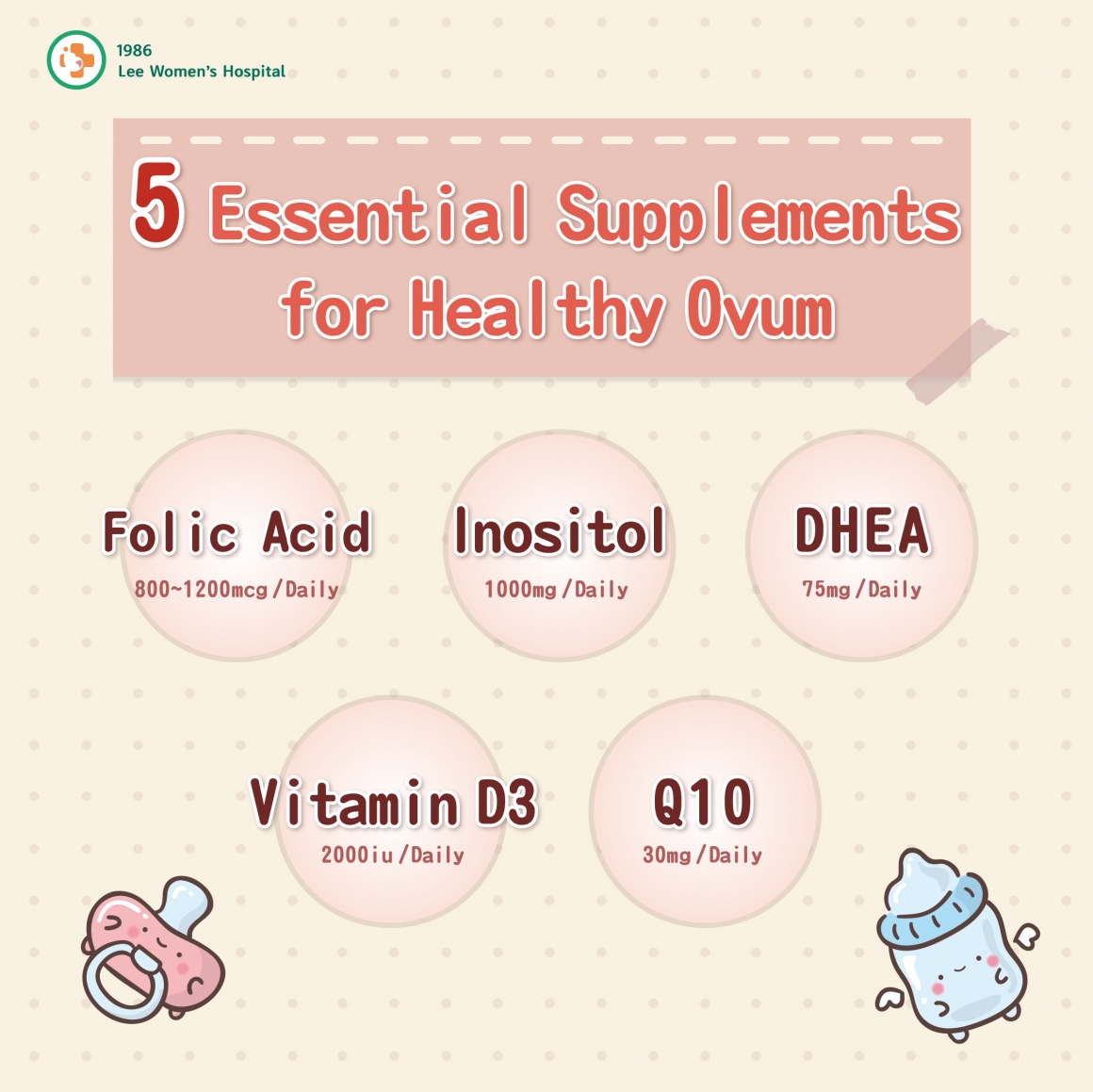Knowledge Sharing
2022.05.18
5 Supplements to Improve Egg Quality for Fertility
Female fertility is not only affected by age but also by the quality and quantity of eggs. According to statistics, the most fertile age is below 35 years old. For women over 40, the ovarian reserve of follicles significantly declines, making natural conception more challenging, with only around 15% success rate. For those in advanced age who wish to cultivate their eggs, it is advisable to start by having an AMH (Anti-Müllerian Hormone) blood test to assess ovarian function.

*Please consult a doctor before taking it. Not recommended for women with polycystic ovary syndrome (PCOS) or pregnant women.
*Inositol may affect oxytocin and uterine contractions, please consult a doctor before taking it.
Further reading: What is Preimplantation Genetic Testing for Aneuploidy (PGT-A)?
If the quality of eggs still cannot be improved, it is recommended to consider artificial insemination or undergo in vitro fertilization (IVF). In IVF, the eggs are collected when the main follicles reach a diameter of 18-20mm. However, it's important to note that according to a study published in the Journal of Endocrinology by an IVF center in New York, the average success rate for IVF in women aged 38-39 is 23.6%, while for women aged 44 and above, the success rate drops to only 1.3%. Therefore, for older women dreaming of having a child, it is advisable to seek professional medical assistance as early as possible.
Lastly, besides nurturing healthy eggs through diet and nutritional supplements, engaging in appropriate physical exercise, maintaining a positive mindset, and avoiding exposure to radiation are also crucial factors in enhancing egg quality.
5 Nutritional Supplements for Egg Quality
Mature and high-quality follicles grow to the ideal diameter or 18mm to 20mm. The process of egg maturity takes about 90 days. Following 5 supplements are recommended to improve egg quality for fertility and increase the chances of natural pregnancy.
5 Supplements to Improve Egg Quality for Fertility
- DHEA: Improves egg quality and reduces miscarriage rates in older women.
- Q10: Enhances egg quality and ovarian function.
- Vitamin D3: Strengthens follicle development and egg quality, as well as ovarian function.
- Inositol: Aids in egg maturation and improves fertilization and pregnancy rates.
- Folic Acid: Enhances regulate ovulation and supports early embryo development.
DHEA
- Function: Improves egg quality and reduces miscarriage rates in older women
- Dosage: 75mg per day
- Suitable for: Women aged 35 and above, those experiencing premature ovarian failure or ovarian dysfunction, and those facing infertility due to increasing age
*Please consult a doctor before taking it. Not recommended for women with polycystic ovary syndrome (PCOS) or pregnant women.
Q10
- Function: Enhances egg quality and ovarian function
- Dosage: 30mg per day
- Suitable for: Women at advanced maternal age and those with premature ovarian aging
Vitamin D3
- Function: Enhance follicle development, egg quality, and ovarian function.
- Dosage: 800 to 2000 IU per day
Inositol
- Function: Aids in egg maturation and improves fertilization and pregnancy rates.
- Dosage: 1000mg per day
*Inositol may affect oxytocin and uterine contractions, please consult a doctor before taking it.
Folic Acid
- Function: Improves irregular ovulation and supports early embryo development.
- Dosage: 800 to 1200 mcg per day
Diet for Healthy Egg - Mediterranean Diet
Dr. Chun-I Lee suggests, "The European Society of Human Reproduction and Embryology (ESHRE) has discussed the importance of a healthy diet for fertility, and the Mediterranean diet is one of them." This diet involves reducing meat and sweet consumption while increasing fish and seafood intake (at least twice a week). It includes moderate protein, daily consumption of vegetables, fruits, and nuts, and staying hydrated. The Mediterranean diet provides the necessary antioxidants and anti-inflammatory properties for fertility, preventing premature ovarian aging, promoting egg development, and reducing the risk of miscarriage.What to do if egg quality is low?
As age increases, the rate of poor-quality eggs also rises, with a rate exceeding 50% for women at the age of 40. However, aging itself does not directly cause chromosomal abnormalities in eggs. Instead, the probability of errors in the maturation process shortly before ovulation increases. In other words, if there are no chromosomal-related disorders, most eggs are normal. It's just that during the three months before ovulation, primary oocytes are stimulated by hormones in the body, and abnormalities may occur during maturation and division, leading to chromosomal anomalies. Therefore, with medical assistance, egg cultivation in advanced age can increase the chances of obtaining healthy eggs.Further reading: What is Preimplantation Genetic Testing for Aneuploidy (PGT-A)?
If the quality of eggs still cannot be improved, it is recommended to consider artificial insemination or undergo in vitro fertilization (IVF). In IVF, the eggs are collected when the main follicles reach a diameter of 18-20mm. However, it's important to note that according to a study published in the Journal of Endocrinology by an IVF center in New York, the average success rate for IVF in women aged 38-39 is 23.6%, while for women aged 44 and above, the success rate drops to only 1.3%. Therefore, for older women dreaming of having a child, it is advisable to seek professional medical assistance as early as possible.
Lastly, besides nurturing healthy eggs through diet and nutritional supplements, engaging in appropriate physical exercise, maintaining a positive mindset, and avoiding exposure to radiation are also crucial factors in enhancing egg quality.




